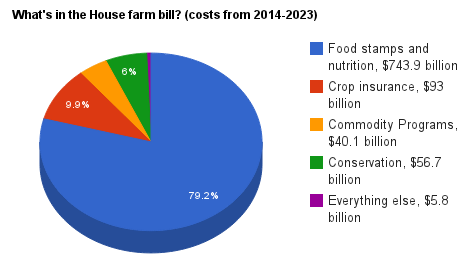… a question unrelated to areas of economics and policy with which I am familiar. Today the U.S. House of Representatives voted down their farm bill proposal. Brad Plumer helpfully provides a pie chart summarizing the spending that the proposed bill would have authorized:
What do you notice? The proposed funding for the SNAP program is enormous, swamping the proposed funding for other programs. Even so, the proposed cuts to SNAP were at the margin what led a lot of representatives to vote against the bill.
Having SNAP and nutrition-related social policy programs in the farm bill makes no sense to me. It seems to me that a lot of the persistence of bad, obsolete, inefficient agricultural policy (agricultural subsidies etc.) is due to the political bargaining and log-rolling that occurs to protect SNAP — if you vote for the SNAP funding I want for my low-income constituents, I’ll vote for the government cheese purchases you want for your dairy farmer constituents. See how this works?
Of course, if there were no mandated cheese purchases to support cheese prices, perhaps low-income families would not find their food prices high enough to cause them budget problems …
So does anyone have either the incentive or the cojones to streamline these programs by moving SNAP into the Health and Human Services budget, and out of the Dept. of Ag. budget? SNAP in HHS makes more sense to me.
Brad Plumer also points out that the absence of a farm bill could lead to a reversion to the 1949 bill:
In theory, the country would eventually revert to the agricultural rules written back in 1949, when the last permanent farm bill was enacted (subsequent bills have all been temporary). That 1949 act was crafted for a very different United States, with smaller crop production and higher consumer prices. So, for instance, dairy prices would skyrocket once outdated price supports came back into effect.
Also in theory (particularly game theory), the reversion outcome is sufficiently bleak to induce action to generate a better alternative. The whole fiscal cliff kabuki theater episode demonstrated that this theoretical prediction is false. Either our “representatives” are sufficiently irrational that they aren’t attracted by the lure of a superior outcome, or they are playing a different game, with a different objective function, from the one posited in the naive strategic model of political decision-making.

Complexity from interacting rules multiplies quickly. Very soon, no congressman can predict just what the outcome would be from voting for a complex bill.
“Do I vote for the new bill, which I can’t understand, and take flak for the possibly bad consequences and interactions? Or, do I vote against it, and rely on the fact that no one else understands it either? Yes, it will revert to something horrible from 1949, but IT WASNT I who did the 1949 bill.”
Government literally becomes unmanageable. All of the conflicts and idiocies will be “fixed up” anyway by selective enforcement.
Most people, including congressmen, cannot tune the picture on a color TV. The three interacting paramaters are beyond them. Yet, our rulers routinely pass bills of hundreds of pages, obfuscated to help certain people who satisfy a cloud of interlocking restrictions.
Laws are routinely not enforced at the whim of the President, and no one cares because it is not clear exactly what enforcement would require. Actions not specifically enabled by law are routinely taken, using some clause or interpretation, here and there, to support them. Obamacare is unconstitutional as a mandate, but somehow constitutitonal as a tax on not buying health insurance. This is madness.
We live in a tyranny. The “rule of law” is entirely made up by our benevolent dictators as they go along. The courts are three years behind the action, and the decisions are political, not legal, as particular pieces and snips are chosen to justify or oppose anything.
Every citizen should find a group, and every group must find a benefactor in government. In Russia that is called having a “roof”. It isn’t what you know, but who you know. Forget the law. That can and will bend easily by funding the right people.
Risk Managers are going to suffer overexposure (and some deafness from cranking the NoFX) at this rate. Perhaps http://www.rma.usda.gov/ was taken a little literally as a human-readable link, and raw milk fans are waiting for labels to reverse all the Federal Inspection stuff. Look for dance your fitness to profit events preceding fairs all over!
Pingback: A confused economist asks… | Fifth Estate